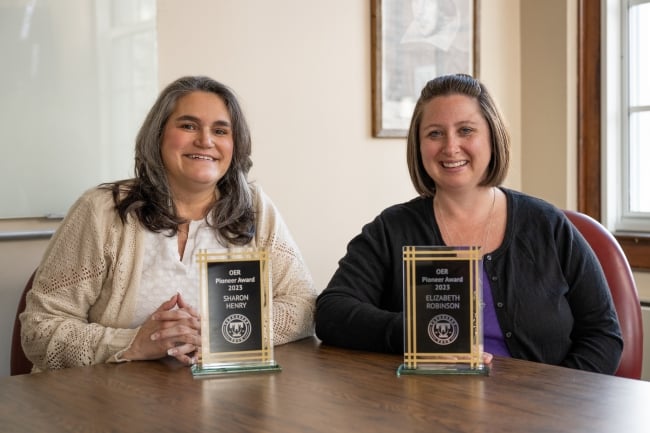You have /5 articles left.
Sign up for a free account or log in.

Tennessee Tech University senior lecturer Sharon Henry and senior instructor Elizabeth Robinson hold their 2023 “OER Pioneer Award” for their leadership in developing zero-cost course materials. The university utilized grant funding to incentivize professors to modify course materials to make them free for students.
Tennessee Tech University
A majority of faculty members say textbook affordability is a top priority for their university, but two in five educators say they need help understanding affordable course material options, the National Association of College Stores’ 2024 Faculty Watch Report found.
Since 2021–22, Tennessee Tech University has utilized grant funding to incentivize faculty members to identify and choose Open Educational Resources (OER) to reduce costs for students. Over the past few years, the program has saved students collectively around $1.4 million dollars and ongoing university funding keeps the program rolling.
What’s the need: A spring 2023 Student Voice survey from Inside Higher Ed and College Pulse found around one-quarter (26 percent) of students believe their faculty do not take affordability into account when choosing course materials.
Faculty Watch also found 92 percent of faculty members are aware of open educational resources, but less than four in 10 use OER available to them.
At Tennessee Tech, faculty, staff and administration recognized the financial burden of paying for expensive course materials and sought to find a solution to mitigate extra expenses for learners and their families.
Getting funding: Mike Gotcher, dean of the College of Interdisciplinary Studies, Sharon Holderman, library coordinator of public services, and Amy Miller, assistant director of study abroad, applied for a $30,000 Tennessee Board of Regents grant to initially fund the OER program at Tech.
The university received a second $20,000 grant after the first term, which allowed the program to continue—focused on English and business instructors.
As of June 2022, the provost’s office at Tech has funded the program, keeping it sustainable and open to all faculty to participate.
How it works: The OER program is open to all professors at the institution from all colleges and departments. A term prior, faculty submit proposals that get reviewed by Tech officials.
Each instructor who participates in the program receives a stipend to explore available resources and convert the resources they’re using into free materials.
During the first semester, eight instructors received a $2,700 stipend each to convert textbook-based classes to courses that used zero-cost multi-media resources, including podcasts, videos and handouts.
Through the Provost’s office, selected proposals get a $1,500 stipend and faculty commit to attending a training workshop in the summer on finding OER and to implementing them in at least one course. Faculty also must distribute a student survey and share feedback from the zero-cost course to gauge the effectiveness of the change.
The impact: Since launching, the program has saved students an estimated $1.4 million collectively. In the spring 2023 term alone, 606 students averaged $94,261 in savings.
In a spring 2023 student survey, 95 percent of respondents found the OERs to be better or about the same as a traditional textbook. If given the opportunity to take a course with free materials or traditional textbooks, 91 percent of students would select a section with free materials.
An added bonus of the work is that faculty members have updated all their materials to be contemporary and relevant to today’s learners, something students say is important to them and their learning. The alternative materials also make class more engaging than traditional reading assignments, faculty say.
The university also rewards innovation in OER uses through the OER Pioneer Awards, started in fall 2023, which recognizes faculty who go above and beyond in the program.
If your student success program has a unique feature or twist, we’d like to know about it. Click here to submit.




